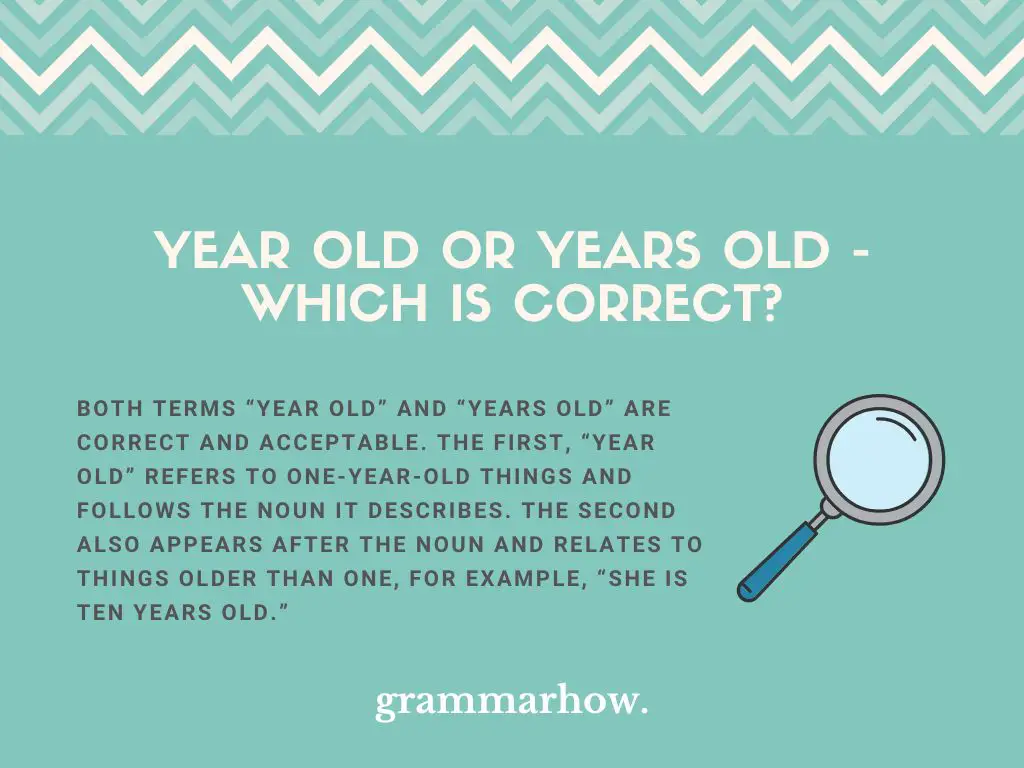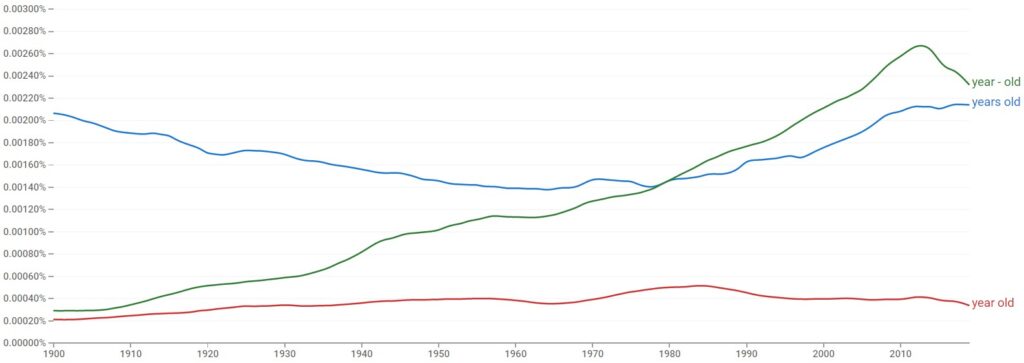When you are talking about how old people or things are, it can be confusing to know whether to use “year old”, “years old”, or “year-old.” This page clarifies the difference between the three spellings and examines which is more commonly used worldwide.
Year Old or Years Old – Which Is Correct?
Both terms “year old” and “years old” are correct and acceptable. The first, “year old” refers to one-year-old things and follows the noun it describes. The second also appears after the noun and relates to things older than one, for example, “She is ten years old.”

The significant difference to remember between “year old” and “years old” is that if you are talking about “one” year, you use “year”, and for “more than one”, use “years.”
- My house is only one year old.
- My house is twenty years old.
“Year old” and “years old” describe how old something is when the noun appears BEFORE the age.
However, when the noun appears AFTER the age, you should use the hyphenated adjective phrase such as “ten-year-old.”
For example:
- I have a five-year-old (boy) and a twenty-year-old (girl).
- We own a two-hundred-year-old castle.
In the above sentence, the gender of the children is not specified, but you can add the word in brackets.
Also, in the above version, it is not always necessary to mention the noun, i.e. “the child”, and the phrase “five-year-old” is often enough for people to understand it is a child.
Year Old
“Year old” is a phrase that describes “how old” something is. Unfortunately, people often confuse this version with the hyphenated adjective phrase “year-old.”
“Year old” should be used to describe things that are “one” year old; once it is more than one, the word “year” must change to “years”.
For example
- My dog is one year old.
- My dog is ten years old.
People often confuse “year old” with the hyphenated adjective phrase used when the noun appears after the age. Therefore you may see:
- My house is one-year-old. – INCORRECT
- My house is ten-year-old. – INCORRECT
The “golden rules” to remember are that if that noun comes first, then you do not use hyphens, and if it is older than “one”, you must use “years.”
Years Old
The term “years old” is used to describe how old something is when it is older than one and when the noun appears before the age in a sentence.
For example:
- My car is ten years old.
- My daughter is five years old.
A common mistake that people make is to confuse “years old” with “years-old.” The difference is that the hyphenated version should only be used when the noun appears AFTER the age. As shown in the examples below:
- I have a ten-year-old house. – CORRECT
- My house is ten years old. – CORRECT
- My house is ten-years-old. – INCORRECT
- I have a ten years old house. – INCORRECT
Year-Old
The term “year-old” is an adjective phrase used to describe the age of something or someone. However, there are a few golden rules to remember regarding the phrase “year-old.”
The first is that the noun always appears AFTER the age, and the second is that the word “ year” must always stay in the singular, regardless of how old the object is.
The following examples show the structure
- A fifty-year-old man
- A ten-year-old debt
- A five-year-old child
Which Is Used the Most?
The Google Ngram Viewer shows that of the three terms, “year-old” is the most commonly used, followed closely by “years old.” On the other hand, the term used the least is “year old”, probably because its only correct use is to refer to something that is “one year old.”

Initially, the hyphenated version was used far less; however, “year-old” became the more common of the three in the 1980s and has remained so ever since. There is no significant variation between UK and US English, so the trend seems more general and not focused on one region.
Final Thoughts
“Year old” and “years old” describe the age of something or someone when the noun appears before the age. “Year old” describes something that is “one year old”, while “years old” describes older objects, like “two years old”. Finally, “years-old” is used when the noun appears after the age.

Martin holds a Master’s degree in Finance and International Business. He has six years of experience in professional communication with clients, executives, and colleagues. Furthermore, he has teaching experience from Aarhus University. Martin has been featured as an expert in communication and teaching on Forbes and Shopify. Read more about Martin here.
